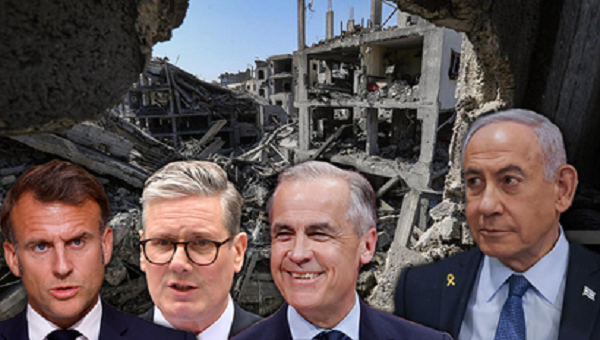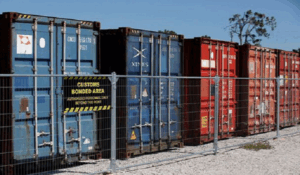‘This escalation is wholly disproportionate’: Canada, U.K. and France threaten action against Israel over Gaza offensive
The leaders of Canada, Britain and France on Monday threatened action against Israel if it does not stop a renewed military offensive in Gaza and lift aid restrictions, piling further pressure on Prime Minister Benjamin Netanyahu.
The Israeli military announced the start of a new operation on Friday, and Mr. Netanyahu said earlier on Monday that Israel would take control of the whole of Gaza. International experts have already warned of looming famine.
“The Israeli Government’s denial of essential humanitarian assistance to the civilian population is unacceptable and risks breaching International Humanitarian Law,” said a joint statement released by Prime Minister Mark Carney, British Prime Minister Keir Starmer and French President Emmanuel Macron.
“We oppose any attempt to expand settlements in the West Bank,” the statement said, adding later: “We will not hesitate to take further action, including targeted sanctions.”
The statement followed Mr. Carney’s weekend trip to Europe for Pope Leo XIV’s inaugural mass. The Prime Minister also met with a number of leaders, promoting Canada as a country pushing for peace in Gaza and Ukraine, as well as a sovereign economy that needs to be less integrated with the United States.
Canada is playing host next month to the G7 leaders’ summit in Kananaskis, Alta., where these themes are expected to form the agenda. Finance ministers of the G7 countries will meet in Banff beginning Tuesday.
In their joint statement, Mr. Carney, Mr. Starmer and Mr. Macron also warned of consequences for the military operations and aid curbs.
“If Israel does not cease the renewed military offensive and lift its restrictions on humanitarian aid, we will take further concrete actions in response.”
Israel has blocked the entry of medical, food and fuel supplies into Gaza since the start of March to try to press Hamas into freeing the hostages taken by the Palestinian militant group on Oct. 7, 2023, when it attacked Israeli communities.
The statement acknowledged Israel suffered a “heinous attack” on Oct. 7 but said the expanded military offensive is not acceptable.
“We have always supported Israel’s right to defend Israelis against terrorism. But this escalation is wholly disproportionate,” the three leaders said, adding that they will not stand by while Mr. Netanyahu‘s government pursues “these egregious actions” in Gaza.
The Prime Minister‘s Office in Canada could not immediately explain what actions might be taken if Israel did not end the military operation and lift restrictions on aid.
PMO spokesperson Emily Williams said Canada is “evaluating our options in consultation with partners.”
Mr. Netanyahu responded on X, saying that “by asking Israel to end a defensive war for our survival before Hamas terrorists on our border are destroyed and by demanding a Palestinian state, the leaders in London, Ottowa and Paris are offering a huge prize for the genocidal attack on Israel on October 7 while inviting more such atrocities.”
He said that Israel “accepts President Trump’s vision and urges all European leaders to do the same,” adding that the war “can end tomorrow if the remaining hostages are released, Hamas lays down its arms, its murderous leaders are exiled and Gaza is demilitarized.”
Thomas Juneau, a professor at the University of Ottawa’s Graduate School of Public and International Affairs, said the only outside criticism that matters to Israel today is from the U.S. “We‘ve seen that clearly since Oct. 7 that pressure from Europeans, Canada, anybody else in the region, barely registers in Israel,” he said.
He said sternly worded statements that only threaten action, rather than announce measures, also achieve little.
It’s too early to say whether the joint statement represents a shift in Canadian foreign policy toward Israel under Mr. Carney, Prof. Juneau said.
Former prime minister Justin Trudeau‘s policy was “broadly pro-Israel, with occasional criticism and only very limited concrete actions,” he said, noting Ottawa imposed two rounds of sanctions on extremist Israeli settlers and other entities in 2024. Canada also in 2024 stopped approving permits for arms exports to Israel.
Prof. Juneau said the new statement is broadly consistent with the Trudeau era. But, he noted, there is growing impatience in the U.S. and Europe with Israel. If Canada’s allies start imposing real measures on Israel and start pushing for Israel to make “painful concessions that are needed for peace,” then it’s likely Ottawa would follow, he said.
Fen Hampson, chancellor‘s professor and professor of international affairs at Carleton University, said Monday’s trilateral statement still represents a “shot across the bow” of Israel from three nations driven by profound humanitarian concern for those in Gaza. It also underscores Mr. Carney’s desire to rebuild transatlantic ties in a meaningful way at a time when Canada is facing challenges from its closest ally, the U.S.
Canada, Britain and France also stated their support for the efforts led by the U.S., Qatar and Egypt for an immediate ceasefire in Gaza, and said they were committed to recognizing a Palestinian state as a contribution to achieving a two-state solution.
Mr. Carney also met with Israeli President Isaac Herzog during his trip. A readout from the Prime Minister‘s Office said during their conversation Mr. Carney reiterated the need for Hamas to release all hostages and stressed the imperative of an immediate ceasefire in Gaza. The Prime Minister also called for urgent humanitarian aid to reach civilians and affirmed Canada’s support for a two-state solution.
The PMO said Mr. Carney and Mr. Herzog agreed that Hamas must lay down its weapons and have no future role in the governance of Gaza.
Israel said it will allow a limited amount of humanitarian aid into Gaza. It said it doesn’t want a “starvation crisis” jeopardizing its new military offensive in the territory of more than two million Palestinians.
The first aid trucks entered Gaza on
Monday after nearly three months of Israel’s complete blockade, according to the Israeli defence body in charge of co-ordinating aid to Gaza. Five trucks carrying aid including baby food entered the territory via the Kerem Shalom crossing.
Global experts had warned of famine in Gaza as a result of the Israeli blockade. Israel cut off all food, medicine and other supplies to the territory to press Hamas over ceasefire terms.
The war in Gaza began on Oct. 7, 2023, when Hamas-led militants attacked southern Israel, killing 1,200 people and abducting 251 others. Israel’s retaliatory offensive has killed more than 53,000 Palestinians, many of them women and children, according to Gaza’s Health Ministry, which doesn’t differentiate between civilians and combatants in its count.
The foreign ministers of Canada, France and Britain, along with those of 18 other countries have called for Israel to fully reopen humanitarian aid delivery to Gaza from the United Nations and non-governmental organizations.
These foreign leaders said the proposal approved by Israel’s security cabinet and the one backed by the U.S. is not one that their “humanitarian partners can support.”
Jon Allen, senior fellow at the University of Toronto’s Munk School of Global Affairs & Public Policy, said Canada’s joint statement with Britain and France could lead other countries to soon join their chorus of harsher criticism of Israel.
It could also influence President Donald Trump to take more action to stop Israel’s latest offensive.
“It’s possible that this could move America in the right direction: Trump has already talked about the siege and the starvation that is being caused – this clearly doesn’t sync with his claim he was going to solve the conflict on the first day of his administration,” said Mr. Allen, who was Canada’s ambassador to Israel from 2006 to 2010.
With reports from Reuters and Associated Press
This article was first reported by AP














